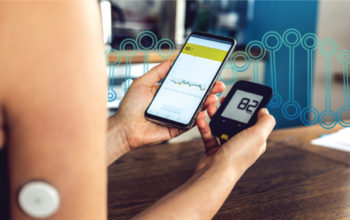As we dive deeper into a technological world, how will healthcare adapt and progress? We shine a light on some exciting medical breakthroughs at Singapore Science Park in recent years, and where healthcare is bringing us.

The world has changed drastically in the past decade, especially in the last five years. Remote robotic surgeries and face transplants are no longer feats of fiction and fantasy, but a confirmation that we’re indeed living in the future of today—one that would not have been possible without the ever-evolving global healthcare industry. In fact, we’re living longer and better lives, evident by the collective increase in life expectancy worldwide.
Now more than ever, technology has become inextricably linked to the medical field. With rapid technological advancements in most other areas of life, the healthcare sector also saw similar significant progress, especially so when the world was pressed to meet the demands of deadly pandemics and disasters. And as technology continues to improve, we can only expect huge transformations in the way we provide and receive medical care.
That said, just what is the new frontier for healthcare? Let’s take a look at some outstanding arenas that have taken the field by storm in recent years.
There’s a good chance you’ve seen the colourful posters plastered around housing estates that promote affordable—sometimes free—health screenings. That’s because early detection and diagnosis allow for swifter action to prevent or delay the onset of diseases.
There now exists various ways to test for diseases, but many predated methods, such as spinal fluid extractions, are invasive and expensive. Nevertheless, artificial intelligence has made detection progressively simpler and more accurate. In fact, a simple blood sample put through the novel Galleri test by US healthcare company, GRAIL, is now all it takes to uncover multiple cancers!
Closer to home, INEX Innovate, Asia’s first healthcare technology company for women, is transcending medical diagnostics at The Capricorn, where its laboratory is located. Using cutting-edge technologies to create a wide scope of detection products for prevailing cancers in females (i.e., breast cancer, ovarian cancer, and endometrial cancer), INEX Innovate aims to empower women one test at a time.
At present, exciting innovations include OvaCis, a near-patient device that can distinguish between benign and malignant epithelial ovarian cysts in just 15 minutes. In addition, mothers can greatly benefit from the company’s groundbreaking development of LEXI, a non-invasive prenatal diagnosis test set to launch in 2023 that isolates foetal cells from maternal blood to detect thousands of genetic conditions, a step ahead of current methods that are only able to draw inferences from maternal blood.
.jpg)
Founded as a spin-out from the National University of Singapore, INEX Innovate develops advanced diagnostics for women's health challenges. Image courtesy of INEX.
Following detection and diagnosis comes treatment, and this area is no less astounding. Thanks to breakthroughs in genetics (the study of heredity) and genomics (the study of gene function), approaches to treatment have evolved to work from the inside out, from drugs that treat type 2 diabetes to cancer immunotherapy that alters immune cells to attack cancer cells.
Regenerative medicine has been a noteworthy game-changer in treating diseases that are harder to cure, such as leukaemia and neuroblastoma, using stem cells—raw materials in the body—to facilitate the replenishment of specialised cells and repair diseased tissue. After all, cell transplants are more viable as compared to relying solely on whole donor organs which are of limited supply.
Leading the change is Medeze Singapore at The Kendall, a stem cell bank that provides access to emerging stem cell therapies for typically incurable conditions. In particular, they specialise in processing, preserving, and storing Mesenchymal Stem Cells (MSCs) that are derived from adipose (fat) tissue. These MSCs are then used to combat a variety of conditions, including the blindness of the cornea, which is the fourth leading cause of vision loss globally.
.jpg)
Mesenchymal Stem Cells harvested by Medeze are multi-potent stem cells that are self-renewing and can adapt into different cell types such as bone, muscle, and nerve.
The greater the understanding we have about the human body, the more we start to recognise that there is no one-size-fits-all solution when it comes to healthcare. Hence, the idea of a patient-centric approach has increasingly been pursued over the years.
Not only does this include the likes of precision medicine, where drugs and treatments are targeted towards different demographics (e.g., age and genetics), personalisation can also give patients the autonomy in how and when they choose to receive medical intervention, which may involve a tailored treatment plan.
One company that was quick to adopt a more personalised medical process is Invitrocue, a world-class provider of personalised oncology to match each unique cancer patient to the best chemotherapy option, located at The Aries. Their key offering, the Onco-Patient-Derived-Organoid test, takes a biopsy of the tumour to be tested using chemotherapeutic drugs and provides a comprehensive report that points to the ideal chemotherapy for each patient, based on in-depth data analysis.
.jpg)
Recognising that no two cancers or patients are the same, Invitrocue's oncologists use an advanced post-biopsy test to guide patients to the right drug at the right time. Image courtesy of Invitrocue.
If there’s one healthcare innovation that most of us would know, it’s the smartwatch. Sure, they might be all the rage now due to their intuitive connectivity and trendy aesthetic, but look beyond the surface, and you’ll realise that they are so much more than mini smartphones or convenient EZ-Link cards, but also powerful, wearable health devices that provide great insights into your health status on the go.
Other considerable applications for wearable devices include smart clothing like diabetic socks that detect foot ulcers, and wristwatches for hard-of-hearing individuals that send sound vibrations through haptic feedback, mimicking the cochlea in the ear. Not only are these technologies beneficial for medical practitioners to accurately monitor patients’ conditions, they also offer individuals living with chronic illnesses more independence with regards to their wellbeing.
Apart from consumer and patient-centric products, did you know that wearable technology can be used to improve research in healthcare too?
At Cintech I, the full-service contract research organisation Medpace does just that, while providing scientific guidance and quality clinical trial management throughout the entire research phase. One of their principal offerings is a wearable biosensor technology that seeks to decentralise clinical testings by integrating cloud-based storage and web portals for remote data collection.

Gone are the days of old-school lab testing as research companies like Medpace explore new technologies to enhance clinical trials. Image courtesy of Medpace.
With technological progression on an upward trajectory, advancements in artificial intelligence and robotics are sure to create many new methods for prevention, diagnosis, treatment, and perhaps cure. Who knows, we may even live to see the cure for cancer one day.
It’s hard to believe that some of the medical technologies that we have become accustomed to or quite literally can’t live without were unthinkable merely a few years ago. Yet, we know from experience that upcoming developments promise to be evermore life-changing. So get ready, because the future of healthcare is here!
Follow us on Telegram (yWC@CapitaLand), Facebook @SingaporeSciencePark and Instagram @yourWorkplaceCommunity, or even subscribe to our newsletter - your Workplace Community to receive latest updates on our tenant engagement activities.